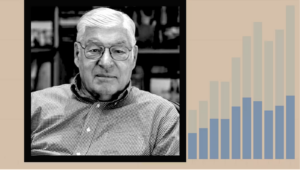Details Are Part of Our Difference
Embracing the Evidence at Anheuser-Busch – Mid 1980s
529 Best Practices
David Booth on How to Choose an Advisor
The One Minute Audio Clip You Need to Hear
Category: Philosophy
The Financial Decision I’m Most Proud Of
This month, you’ll notice our survey question invites you to reflect on what financial decision you’re most proud of. It’s a great opportunity to pause and acknowledge the milestones—big or small—that bring you closer to your goals. As I thought about this question, one decision immediately came to mind.
As I write this, my family and I are on the cusp of a new chapter. Our daughter (a junior in high school), born just two years after we started Hill Investment Group, is now preparing for college. We recently took our first college tour together—a moment that felt both surreal and gratifying.
What makes this milestone even more meaningful is the financial foundation we laid for her education. Like many of you, we started a 529 college savings plan shortly after she was born—when she received her Social Security number, to be exact. At the time, saving for college felt abstract, almost odd. She was still an infant, and college seemed a lifetime away. But we made the decision to start, set a clear goal of having two years of college funded by the time she graduates from high school, and stuck with it. Today, that plan has grown with the power of markets, and it will help cover a significant portion of her next phase.
This journey reinforces something we talk about often at Hill Investment Group: the power of the long view. A clear goal, consistent contributions, and the discipline to stay the course—even when the market tempts you to second-guess—are at the core of successful investing. It’s the same philosophy we apply to everything we do for our clients.
And just like you, I’m a client too. I’ve felt the sacrifices that come with prioritizing savings, along with the satisfaction of watching a plan work over time. As we look ahead to this exciting next chapter for our daughter, I feel proud—not just of the financial growth but of the steady, intentional path we’ve taken. We believed in the data and evidence that our initial decision was founded upon, and that belief, coupled with disciplined behavior, has allowed us to achieve our goal.
So, as the year winds down and you reflect on your own financial decisions, I encourage you to think about what you’re most proud of. What goals have you set? What steps have you taken to achieve them? And most importantly, how can we help you take the long view toward whatever comes next?
Here’s to steady progress and celebrating milestones—big and small.
Happy Holidays!
This testimonial is provided by a current client who received no compensation for their statement. Their experience reflects their personal results, which may not be representative of all clients. Investing involves risk, and past performance does not guarantee future results.
A Legend Passes
The investing world recently lost one of its quiet pioneers, Mac McQuown. While his name may not be widely recognized outside our industry, his influence runs deep. A trailblazer in modern investing, Mac’s visionary contributions laid the groundwork for the strategies many investors benefit from today. As David Booth, Co-Founder of Dimensional Fund Advisors, aptly noted, Mac was a true transformer in the field. [Click the quote to read Dimensional’s tribute.]
“Catalyst” is the keyword. There are so many useful nuggets in the attached article in the Financial Times that you’ll be better off reading it. In a short space, you will learn the history of evidence-based investing, the first index fund (Mac’s creation), the birth of many future Nobel Laureates, and their impressive connection to Dimensional, Blackrock, and other global finance leaders.
If you want to know and understand the recipe you’re investing in when investing with Hill, this is one of the better shortcuts to taking the long view you’ll ever read.
Master Yourself (and let us help)
 One of our all-time favorite columnists, whose insights we’ve shared here before, is Jason Zweig of The Wall Street Journal. Jason authors “The Intelligent Investor,” a column named after Benjamin Graham’s classic book—often referred to as the ultimate guide on investing. (Warren Buffett calls it “the best book about investing ever written!”)
One of our all-time favorite columnists, whose insights we’ve shared here before, is Jason Zweig of The Wall Street Journal. Jason authors “The Intelligent Investor,” a column named after Benjamin Graham’s classic book—often referred to as the ultimate guide on investing. (Warren Buffett calls it “the best book about investing ever written!”)
Jason’s opening line in his latest article sums up a core message you’ve seen here for years and in our client letters:
“Investing isn’t about mastering the markets; it’s about mastering yourself.”
Put simply, your behavior as an investor has a greater impact on your long-term returns than any market movement. This is where we come in—to help you stay calm and fully invested, whether markets are booming or turbulent.
As Benjamin Graham said in 1949:
“The investor’s chief problem—and even his worst enemy—is likely to be himself.”
In today’s environment, staying steady is harder than ever with social media, trading apps, and online distractions. For more on why, we highly recommend Jason’s full article here, which includes links to further resources. And of course, we’re always here to talk through any of these topics—just give us a call or schedule a time here.


